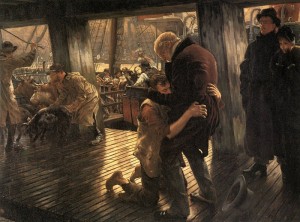 If there were no consequences whatsoever for any destructive behaviour you engaged in, would you want to engage in it? Someone asked me that question once, and its profundity has caused me to think long and hard. If there were no consequences for cheating on my wife, for stealing what wasn’t mine, for taking credit when I didn’t deserve it, would I do it?
If there were no consequences whatsoever for any destructive behaviour you engaged in, would you want to engage in it? Someone asked me that question once, and its profundity has caused me to think long and hard. If there were no consequences for cheating on my wife, for stealing what wasn’t mine, for taking credit when I didn’t deserve it, would I do it?
The issue here is, where is my heart at? How captive am I to that which enslaves me? Many years ago Gil Cann said in a sermon that when we think of our inner life, the heart of the matter is the matter of the heart. At the end of the day, what we all need is a heart transformation. As U2 sang even more years ago, “a new heart is what I need. Oh God, make it bleed!”
Where is my heart at? Do I want what is right simply because it is right? With God’s help, yes I do. But as Alexander Solzhenitsyn said, there is a line that divides the good and evil in every human heart. In our heart of hearts there is a desire to do good which sits alongside a desire to get whatever we can for ourselves. A heart that is being redeemed by grace is one which wants to become more like Christ, that just wants to do the right thing. It is a heart that is sick of its own selfishness and deception, a heart that confesses it is in need of grace, a heart that cries out for renewal.
The human heart needs transformation, and it can only be done by the Holy Spirit. Social justice can’t do it, simply reading the Bible can’t do it, and listening to your favourite preacher or reading your favourite Christian books won’t do it. Only a heart open to the conviction of the Holy Spirit of God is one that will change.
Part of the way the world is set up is that there are consequences for our actions. There are good consequences or there are destructive consequences. We reap what we sow. It cannot be any other way. There are some things we just need to accept in life, and this is one of them.
But not only is this the way life works, it is the wonderful truth of the Christian message. There are consequences that go beyond what we experience in this life, but at the same time those consequences are utterly dependent on our actions in this life. The kingdom of God has broken into history and will one day be fully consummated. Things will one day be finally put to rights. There will be a day when the first will be last and the last will be first, when those who constantly suffer now because of injustice will at last get to see justice, when those who are downtrodden will be downtrodden no more. All the suffering that goes on in the world today is not meaningless; it is in fact redemptive. It will be used for good and it drives us toward hope, the sure hope that one day everything will be put to rights and suffering will be no more.
So, in one sense, the question of whether or not my behaviour would change if there were no consequences is a moot one. The fact is there are consequences and we can’t do anything to avoid the fact. It is a bit like asking what life would be like if there were no gravity on the earth. Our existence just isn’t like that.
Yet on the other hand the question is highly relevant, because it is a question that quite literally speaks to our ultimate motivations for doing the things we do in life. It is a question that asks where our hearts are at. Are we altruistic because it makes us look good and holy in front of our Christian brothers and sisters? Or are we altruistic because we really want to glorify God and see his kingdom of love and transformation come on earth as it is in heaven? Truth be told, we spend most of our lives hovering between both. I know I do. As I continue on this journey of life though, I am also more convinced that living a life daily surrendered to the God of Jesus Christ is the only way to find the sense of home that our restless hearts yearn for.
When we think of the secret thoughts that we have, or even the secret actions that we might engage in, what do we think of the consequences? What do you do with those secret thoughts you have that you are too ashamed to admit? For us men it is said that all of us are faced with the temptation at some point in our lives to run away from everything. Women may have similar dark thoughts. The problem is not so much that we have them, but how we deal with them. This is where it is crucial to have a person or people in our lives with whom we can share our darkest thoughts without shame, with the knowledge that we will still be accepted for who we are, and to know that such thoughts and desires can be redeemed.
My heart needs redeeming every day. It needs desperately to be brought in line with the heart of God. I am sometimes tempted to live like there are no consequences to my actions. But when I am deceived by such thoughts, it is then that I need to be reminded of the transforming love of God in Jesus to change me from the inside out, to create in me a clean heart and renew within me a right spirit. God help me to live such a surrendered life.
 Here is a beautiful piece on grace and its saving impact on our lives:
Here is a beautiful piece on grace and its saving impact on our lives:








